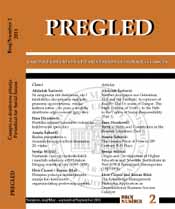Primjena principa menadžmenta znanja kao katalizator organizacijskog poslovnog uspjeha
The Knowledge Management Principles Application as Organizational Business Success Catalyst
Author(s): Kenan Bilal, Elvir ČizmićSubject(s): Economy
Published by: Univerzitet u Sarajevu
Keywords: Knowledge Management; Organizational Culture; Intangible assets; Human capital; Learning organization
Summary/Abstract: Organizational success, within the contemporary business environment, depends of the intensity of knowledge creation, knowledge sharing, knowledge generation and organizational knowledge maintenance. Knowledge Management comprises a scope of business practices used by organizations to identify, create, represent, sharing and distribute knowledge for reuse, awareness and learning. These facts show that Knowledge Management programs should be typically near tied to organizational business strategy. It means that the main goal of Knowledge Management ought to be achieving specific outcomes, such as shared intelligence, improved performance, competitive advantage, or higher levels of innovation and entrepreneurship. Ultimately, the ability of contemporary organization to meet not only its current goals and objectives, but also to create and grasp future opportunities, will depend on its ability to create value from the intangible assets using a certain concept of Knowledge Management. It is only by identifying, managing and developing the full spectrum of intangible assets that organization be able to unlock its full creative potential. This work paper is aimed to research potential of Bosnia and Herzegovina organizations in sense of using knowledge management principles as basement for their competitive advantages building.
Journal: PREGLED - časopis za društvena pitanja
- Issue Year: LII/2011
- Issue No: 2
- Page Range: 97-121
- Page Count: 25
- Language: Bosnian

